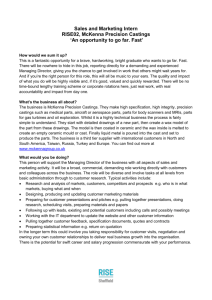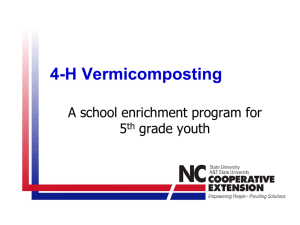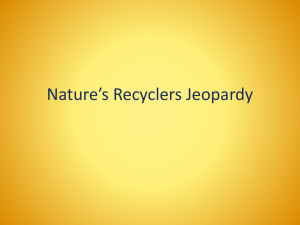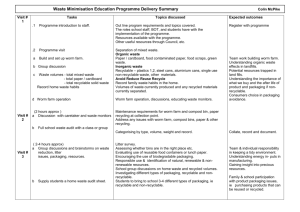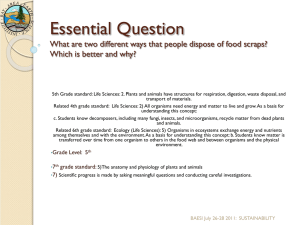Market Opportunities for Biosolid-Based Vermiculture in Georgia The University of Georgia
advertisement
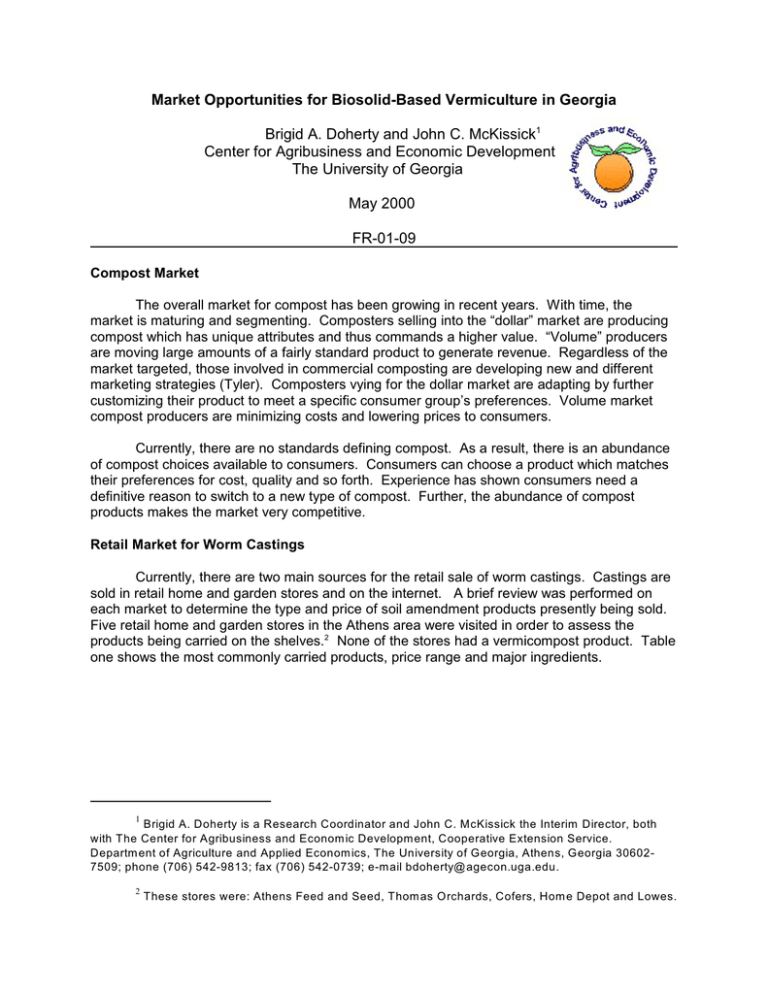
Market Opportunities for Biosolid-Based Vermiculture in Georgia Brigid A. Doherty and John C. McKissick1 Center for Agribusiness and Economic Development The University of Georgia May 2000 FR-01-09 Compost Market The overall market for compost has been growing in recent years. With time, the market is maturing and segmenting. Composters selling into the “dollar” market are producing compost which has unique attributes and thus commands a higher value. “Volume” producers are moving large amounts of a fairly standard product to generate revenue. Regardless of the market targeted, those involved in commercial composting are developing new and different marketing strategies (Tyler). Composters vying for the dollar market are adapting by further customizing their product to meet a specific consumer group’s preferences. Volume market compost producers are minimizing costs and lowering prices to consumers. Currently, there are no standards defining compost. As a result, there is an abundance of compost choices available to consumers. Consumers can choose a product which matches their preferences for cost, quality and so forth. Experience has shown consumers need a definitive reason to switch to a new type of compost. Further, the abundance of compost products makes the market very competitive. Retail Market for Worm Castings Currently, there are two main sources for the retail sale of worm castings. Castings are sold in retail home and garden stores and on the internet. A brief review was performed on each market to determine the type and price of soil amendment products presently being sold. Five retail home and garden stores in the Athens area were visited in order to assess the products being carried on the shelves.2 None of the stores had a vermicompost product. Table one shows the most commonly carried products, price range and major ingredients. 1 Brigid A. Doherty is a Research Coordinator and John C. McKissick the Interim Director, both with The Center for Agribusiness and Econom ic Developm ent, Cooperative Extension Service. Departm ent of Agriculture and Applied Econom ics, The University of Georgia, Athens, Georgia 306027509; phone (706) 542-9813; fax (706) 542-0739; e-m ail bdoherty@ agecon.uga.edu. 2 These stores were: Athens Feed and Seed, Thom as Orchards, Cofers, Hom e Depot and Lowes. Table 1: Soil Amendment Products in Athens Area Retail Stores Product Price Range Stores Ingredients Jungle Growth $4 - 5 for a 40 qt bag Athens Feed and Seed Pine bark, peat m oss, perlite, verm iculite, charcoal, m inerals Black Kow $2 - 4 for a 50 lb bag Athens Feed and Seed, Hom e Depot, Lowes Cow m anure Plant-tone $11 - 15 for a 25 lb bag Thom as Orchards, Cofers Dehydrated m anure, anim al tankage, crab m eal, cocoa m eal, bone m eal, dried blood, sunflower m eal, kelp, greensand, rock phosphate, sulfate of potash Milogranite $8.50 - 10 for a 40 lb bag Cofers, Hom e Depot Recycled, heat-dried biosolids Nature’s Helper $1.50 - 3 for 2 cu ft Athens Feed and Seed, Hom e Depot, Lowes Pine bark, other An internet search uncovered many sites marketing worms and worm products3 . The most notable aspect of the internet search is that most individuals and businesses selling worm castings over the internet are also selling worms and worm composting materials. It is extremely rare to find someone marketing only the worm castings. In addition, a wide variety of worm casting products are sold. The primary target of most of the visited sites is the home composter. These sites make available everything from the worms to the worm bins to books on establishing home worm composting systems. None of the farms reviewed on the web are located in Georgia. The closest farms were in Clover, South Carolina (which is extreme north South Carolina) and Tennessee. Several farms are in Pennsylvania, California, Oregon, and Washington. Other farm locations include Connecticut, Texas, Illinois, Australia and Scotland. Three main products derived from worm castings appear to be sold. The first is the worm castings themselves. These are typically sold by the bag although a few places sell in bulk. Bag sizes range from l to 30 pounds. Prices cover a wide range with only some of the quoted prices including shipping. The second product is worm castings mixed with other compost or soil to create a special potting soil or sod mix. A good example is Rainbow Worm Farm’s product, Rainbow Potting Soil, which is a blended mixture of sifted worm castings, composted fir bark, peat moss, and red volcanic rock. A third product is “tea.” Tea is a liquid product formed by adding hot water to worm castings. Wright Worm Farm markets a tea product. Table two lists several of the worm farms, their products and prices. None of the products sold by these companies are generated by worms fed on biosolids. 3 A web ring of websites relating to worm s can be found at: http://nav.webring.org/cgi-bin/navcgi?ring=worm digest;list. 2 Table 2: Worm Casting Products and Prices Available over Internet Com pany Product and Size Price Rainbow W orm Farm Sacked Castings - 3 lbs $10 includes shipping Sacked Castings - 1 cu. ft. $45 includes shipping Bulk Castings - 1 cu yard $50 excludes shipping Potting Soil - 3 lbs $9 includes shipping Potting Soil - 1 cu. ft. $38.50 includes shipping Sod Mix - 1 cu. yard $50 excludes shipping Barefoot Soil - 1 cu. ft. $8.50 excludes shipping Barefoot Soil Potting Mix - 1 cu. ft. $10.95 excludes shipping Blair’s Bait Farm Bagged Castings - 25 lbs $20 includes shipping east of Mississippi W right W orm Farm Castings - 10 lbs $10.95 excludes shipping W orm Tea - 1 qt $6.95 excludes shipping Castings - 4 lb reusable bucket w/scoop $11 includes shipping $5 without Castings - 12 lb resealable bag $21 includes shipping $9 without Castings - 30 lb bag $31 includes shipping Fam ily W orm Farm Castings - 20 lb bag $10 excludes shipping Am brose W orm Products Castings - 25 lb bag $20 includes shipping Beaver Bait Com pany Castings - 1 qt $2.98 includes shipping Castings - 1 gal $10.98 includes shipping Castings - 5 gal $49.95 includes shipping Yelm Farm s W orm W orld Future Market for Worm Castings The vermicompost market is one which has remained relatively unexplored. As the internet search showed, prices and package sizes vary dramatically. This is largely due to an unestablished market. Many vermiculturists and composters believe that although the market is undeveloped, potential is strong for castings. Bruce Eastman, Assistant Manager of the Orange County Environmental Protection Division in Orlando Florida, summarized in a recent interview “currently there’s not the tremendous demand that I would like to see.....I think the demand is going to be there” (Casting Call). 3 While research into the market for worm castings is limited, some work has been conducted into the market for compost and soil amendments. The end destination of the compost will affect the characteristics and qualities desired in a compost. However, compost buyers generally rank elements of importance in the buying decision in the following order: quality, price, appearance, information and reliable supply (Sherman). Biosolids-based worm castings face a slightly different market scenario. The use of biosolids in the composting process eliminates the produced worm castings from being classified as organic under USDA rules currently being considered. Further, the average consumer carries a negative image of using biosolids in planting and gardening. There is also some concern about the safety of using biosolids-based vermicompost. The debate centers on the ability of worms to remove pathogens from the biosolids. Early studies done at the University of Georgia and by the Orange County Environmental Protection Division indicate that worms can successfully reduce pathogens (Eastman). However, extensive education will be required to change public perception. Given these restrictions on biosolids-based compost, research indicates that the greatest potential for vermicompost is in the landscaping and lawn care sector. This group appears to be the least sensitive to the health issues of using vermicompost (Lohr). For example, sod layers may be a viable market if the castings can be incorporated into the ground before the sod is laid. Experiences of a North Georgia Company While no products containing worm castings were found in Athens, a company in north Georgia does market worm castings. This company does not produce its own worm castings, but rather contracts for castings with a worm producer in the southeastern United States. The worm producer focuses his operation only on the production of worms and the castings are a by-product of his business. The north Georgia company receives castings and converts them in a variety of products. Most of the marketed products are soil amendments with worm castings as only one ingredient in the mix. However, the company does sell some pure worm castings in a bagged form. The company sells into both the wholesale and retail markets in Atlanta. The company has some clientele in the landscape industry. This north Georgia company has been fairly successful. It owes its success to a variety of factors including: a wide variety of appealing products, location to the Atlanta speciality markets, and the provision of a quality, reliable product in the appropriate quantity. Observations on Market Potential of a South Georgia Producer Currently, an entrepreneur in southern Georgia is considering marketing worm castings. He began raising worms a few years ago to sell as bait in his sporting goods store. Recently, he became interested in vermicomposting. His operation is fairly small-scale and limited by his location. The operation is presently operating out of the basement of an old hotel. While this area is well-suited for the production of worms, it has a few drawbacks for worm production. Expansion is not possible in the current location and the heavy worm castings must be moved up the stairs and out of the basement. As of now, he has not sold any of his product. The 4 worms are primarily fed on biosolids from a local waste water treatment plant with some manure and restaurant grease in the feed mix. The brief, initial market research indicates that the market for this producer is fairly limited. The major hindrance is that of consumer perception of a biosolids-based product. Many consumers will be hesitant to use a biosolids-based compost on home lawns or in places exposed to human use. Further, if the product can not be classified as organic, a niche market is eliminated. Given the heavy weight of castings, selling into a large geographic area is restricted by transportation costs. Considering all these factors, marketing worm castings as a bulk product to the landscape and lawn services sector probably offers the strongest potential for the producer. The turfgrass industry, which has a strong base in southern Georgia, may also be a possibility. The producer, however, is limited in volume by his location. His size makes bagging a more practical approach to selling worm castings. The producer is in the process of establishing a web site. His plan is to market a 60 pound bag inside a box for $49.95. As shown by internet research, this is probably the cheapest price (cents per pound). However, this large size of a package may not be the most appealing to the consumer. A smaller package, despite being more expensive (cents per pound) is easier to use and handle. Home gardeners and house plant growers will potentially want the ease of a smaller package. In addition, shipping costs for the heavy castings can be prohibitive. Dan Cardoza, the owner of Rainbow Worm Farms, stated that the trouble with internet sales is that shipping is expensive and that reduces the consumer’s desire to buy on-line. Marketing into the regional market of southwestern Georgia and northwestern Florida can assist in avoiding high transportation costs. A small bagged product could be developed. This product could then be placed on shelves in local, independent home and garden centers. Farmer’s markets are also a potential market. No matter the targeted market, consumers will have several requirements. Their concerns would be consistency of product, weed seeds, pathogens and appearance. The producer would have to provide assurance to the consumer that the product consistently has the same characteristics. This may translate into frequent testing to verify the attributes of the compost, both over and within batches. It may require a more consistent mix be fed to the worms. In conclusion, a market opportunity for biosolids-based castings exists. Vermiculture and vermicomposting are gaining recognition and popularity. Consumers need to be educated about the benefits of the product and reassured about its perceived drawbacks. Smaller bagged or boxed products may appeal to the internet market while larger bagged products may be marketed in speciality retail markets. However, the real market for this type of product appears to be the bulk market. 5 References Casting Call. “Interview with Bruce R. Eastman, Part II.” Casting Call. Volume 4, Issue 6. April 2000. Available at: www.vermico.com. Eastman, Bruce. Vermiculture’s Effectiveness as an Alternative to Standard USEPA Class A Stabilization Methodologies. Water Environment Federation. New Orleans. 1999. Lohr, Luanne. Attributes of Ideal Soil Substitutes: Results of A Survey of Demand Sectors. Faculty Series Paper 96-20. Department of Agricultural and Applied Economics. The University of Georgia. December 1996. Sherman, Rhonda. Large-Scale Organic Materials Composting. Department of Biological and Agricultural Engineering. North Carolina State University. 1999. Tyler, Rod. “Fine-tuning Compost Markets.” Biocycle. August 1994. 6
